- Join our 7+ lakh Dhani family.
- Open your Dhani Stocks free trading account online now


F&O Trading lets you trade in futures and options (F&O) segment. F&O contracts are derivative instruments traded on the stock exchange. The instrument has no independent value, with the same being ‘derived’ from the value of the underlying asset. The asset could be securities, commodities or currencies. Its value varies with the value of the underlying asset. The contract or the lot size is fixed. Futures contract: means you agree to buy or sell the underlying security at a 'future' date. If you buy the contract, you promise to pay the price at a specified time. If you sell it, you must transfer it to the buyer at a specified price in the future. Options contract: This gives the buyer the right to buy/sell the underlying asset at a predetermined price, within, or at end of a specified period. He is, however, not obligated to do so. The seller of an option is obligated to settle it when the buyer exercises his right.
Derivatives are financial instruments whose value is derived from other underlying assets. This means that the derivative by itself doesn't hold any value of its own. There are mainly four types of derivative contracts such as futures, forwards, options & swaps. However, the most popular and preferred derivative instrument is Future & Options.
Derivatives provide numerous advantages to the financial markets but some major ones are:
1. Hedging risk exposure.
2. Underlying asset price determination.
3. Market efficiency.
There are mainly four types of derivative contracts such as futures, forwards, options & swaps.
1. FuturesA Future is a contract between parties to buy or sell an asset at a specified date in the future for a pre-settled price. There are two types of futures traded in the stock market- index futures and stock futures.
2. OptionsOptions provide the buyer of the contract the right, but not the obligation, to purchase or sell the underlying asset at a predetermined price.
3. ForwardsForward contracts are an agreement between the parties to sell something on a future date. Forwards and Futures are essentially the same however forwards more flexible contracts are because the parties can customize the underlying asset as well as the quantity of the asset and the date of the transaction.
4. SwapsSwaps are contracts that allow the exchange of cash flows between two parties. The underlying security under swap contracts is the interest rate or currency. The most popular types of swaps are interest rate swaps, commodity swaps, and currency swaps.
Future and Options are traded in NSE
1. Open an online trading account: To start trading in Derivatives, you will require to open a trading account. You can easily open your Trading account with Dhani Stocks within 15 minutes.
2. Select an Initial Investment amount: You have to make an initial investment to start trading. The initial margin varies for different scrips, in case of Futures or Option writing. To buy Option you need to pay applicable premium.
3. Build on a trading strategy: You need to have a plan to start Derivative trading. You can make a plan based on the understanding of the market, your trading style, risk appetite, capital availability, etc.